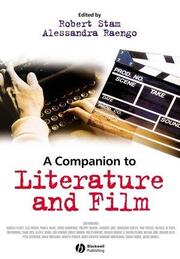-
Zusatztext
-
A Companion to Literature and Film provides state-of-the-art research on world literature, film, and the complex theoretical relationship between them. Twenty-five essays by international experts cover the most important topics in the study of literature and film adaptations. Contributors explore, in a highly innovative and groundbreaking way, important topics in the field. These include: * Key issues such as dialogism, hidden intertextuality, and adaptation as readings, critiques, and rewritings of source novels * Cultural concerns including iconophobia and the word/image wars * Theoretical issues such as "transécriture" and "intermediality" * Genre topics including "hagiopic" and the apocalyptic film * The relationship with other media, including photography and painting * Consideration of format, including seriality, and diverse source material * Thematic subjects such as hetero-masculinity in The Talented Mr Ripley and libertinage in the work of Eric Rohmer. The combination of theory and sophisticated readings of novels and adaptations adds up to a tour de force that reshapes and reconfigures the very field of literature and film studies.
-
-
Kurztext
-
A Companion to Literature in Film provides state-of-the-art research on world literature, film, and the complex theoretical relationship between them. 25 essays by international experts cover the most important topics in the study of literature and film adaptations.
-
-
Autorenportrait
- InhaltsangabeList of Illustrations. Notes on Contributors. Preface. Acknowledgments. 1. Novels, Films, and the Word/Image Wars: Kamilla Elliott (University of California at Berkeley). 2. Sacred Word, Profane Image: Theologies Of Adaptation: Ella Shohat (New York University). 3. Gospel Truth? From Cecil B. DeMille to Nicholas Ray: Pamela Grace (New York University). 4. Transécriture and Narrative Mediatics: The Stakes of Intermediality: André Gaudreault (University of Montreal) and Philippe Marion. 5. The Look: From Film to Novel: An Essay in Comparative Narratology: Francois Jost (Sorbonne). 6. Adaptation and Mis-adaptations: Film, Literature, and Social Discourses: Francesco Casetti (Catholic University of the Sacred Heart). 7. The Invisible Novelty: Film Adaptations in the 1910s: Yuri Tsivian (University of Chicago). 8. Italy and America: Pinocchio's First Cinematic Trip: Raffaele De Berti (University of Milan). 9. The Intertextuality of Early Cinema: A Prologue to Fantomas: Tom Gunning (University of Chicago). 10. Cosmopolitan Projections: World Literature on Chinese Screens: Zhang Zhen (New York University). 11. The Rhetoric of Interruption: Allen Weiss (New York University). 12. Visualizing The Voice: Joyce, Cinema And The Politics Of Vision: Luke Gibbons (University of Notre Dame). 13. Adapting Cinema to History: a Revolution in the Making: Dudley Andrew (Yale University). 14. Photographic Verismo, Cinematic Adaptation, and the Staging of a Neorealist Landscape: Noa Steimatsky (Yale University). 15. The Devil's Parody: Horace McCoy's Appropriation and Refiguration of Two Hollywood Musicals: Charles Musser (Yale University). 16. The Sociological Turn of Adaptation Studies: The Example of Film Noir: R. Barton Palmer (Clemson University). 17. Adapting Farewell, My Lovely: William Luhr (Columbia University). 18. Daphne du Maurier and Alfred Hitchcock: Richard Allen (New York University). 19. Running Time: The Chronotope of The Loneliness of the Long-Distance Runner: Peter Hitchcock (Baruch College, CUNY). 20. From Libertinage to Eric Rohmer: Transcending 'Adaptation': Maria Tortajada (University of Lausanne). 21. The Moment of Portraiture: Scorsese Reads Wharton: Brigitte Peucker (Yale University). 22. The Talented Post-structuralist: Hetero-masculinity, Gay Artifice, and Class Passing: Chris Straayer (New York University). 23. From Bram Stoker's Dracula to Bram Stoker's Dracula: Margaret Montalbano (New York University). 24. The Bible as Cultural Object[s] in Cinema: Gavriel Moses (University of California at Berkeley). 25. All's Wells that Ends Wells: Apocalypse and Empire in The War of the Worlds: Julian Cornell (New York University). Index
Detailansicht
A Companion to Literature and Film
Blackwell Companions in Cultural Studies
ISBN/EAN: 9781405177559
Umbreit-Nr.: 4622692
Sprache:
Englisch
Umfang: 480 S.
Format in cm:
Einband:
kartoniertes Buch
Erschienen am 11.12.2007
Auflage: 1/2007


